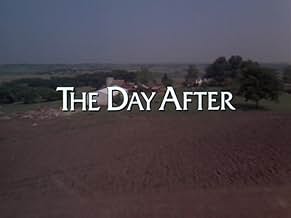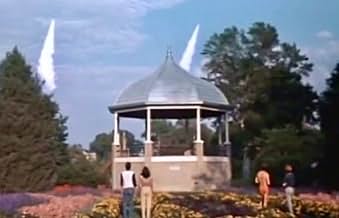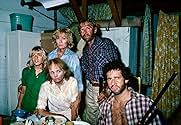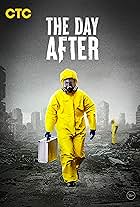Os efeitos de um devastador holocausto nuclear sobre os residentes de uma pequena cidade no leste do Kansas.Os efeitos de um devastador holocausto nuclear sobre os residentes de uma pequena cidade no leste do Kansas.Os efeitos de um devastador holocausto nuclear sobre os residentes de uma pequena cidade no leste do Kansas.
- Ganhou 2 Primetime Emmys
- 6 vitórias e 11 indicações no total
Steve Guttenberg
- Stephen Klein
- (as Steven Guttenberg)
Avaliações em destaque
This movie can never be outdated. One of the two scariest non-horror movies I have seen (deliverance is the other), this movie portrays a realistic (if to a lesser degree) of what could happen if there ever were a nuclear attack. Gosh, did it ever scare me! It made me think, too. I still rank is as an excellent film, even though it has been so long since I saw it.
*** out of ****
*** out of ****
I just finished watching this movie for the first time and had to give a comment. I was only 5 when this movie came out and don't remember seeing it, but growing up next to a military base, the threat of a nuclear attack, although remote was in the back of our minds.
While this movie is not perfect (they should have had a couple less story lines going), this movie is the best attempt to show what was previously a very realistic scenario. While it's very toned down from what would actually happen after a nuclear attack, showing people out in the middle of nowhere trying to survive or just showing everyone die in a matter of a few days would not have had the same impact. This movie shows as graphically as could be shown on US network television a glimpse of the horror of nuclear war. The special effects and makeup are very good for a made for TV movie in 1983, impressive actually. The attack is shown is a very shocking and realistic manner (other than lessening the actual size of damage that would occur). The aftermath makes you realize that the lucky ones were those that were instantly vaporized. Although they don't show it, you realize that all of the characters that fought for so long against radition poisoning were not going to make it much longer. It shows many sides of human nature that would come to the surface under such circumstances and hints towards even worse ones that couldn't be shown. Although the cold war is behind us, these weapons are still around and there will come a time someone wants to use them. Everyone should see this movie to give them at least a small glimpse at why we can never allow that to happen.
While this movie is not perfect (they should have had a couple less story lines going), this movie is the best attempt to show what was previously a very realistic scenario. While it's very toned down from what would actually happen after a nuclear attack, showing people out in the middle of nowhere trying to survive or just showing everyone die in a matter of a few days would not have had the same impact. This movie shows as graphically as could be shown on US network television a glimpse of the horror of nuclear war. The special effects and makeup are very good for a made for TV movie in 1983, impressive actually. The attack is shown is a very shocking and realistic manner (other than lessening the actual size of damage that would occur). The aftermath makes you realize that the lucky ones were those that were instantly vaporized. Although they don't show it, you realize that all of the characters that fought for so long against radition poisoning were not going to make it much longer. It shows many sides of human nature that would come to the surface under such circumstances and hints towards even worse ones that couldn't be shown. Although the cold war is behind us, these weapons are still around and there will come a time someone wants to use them. Everyone should see this movie to give them at least a small glimpse at why we can never allow that to happen.
I was a naval aviator deployed aboard the USS Ranger (CV-61) when I first saw this film. The show had aired back in the States some time before the film reels (this was before video tape decks were commonplace) were flown out to our Battle Group, so we knew that the telecast had had a big impact on the American public before we had the chance to view it.
That didn't matter. The film had as great, and possibly even more of, an impact on those of us out on the "tip of the spear" as it did on those back home. The military characters seen in the film were not actors -- they were contemporaries of ours, some even familiar faces -- so we felt a true connection to the story. The tension between the US and the Soviet Union was real and nobody knew better than we how nasty things could get in a short period of time. Even as we watched the film over the ship's closed circuit television system, Soviet military units were intent on locating and targeting our Battle Group. Our job, our daily routine, was part of the story, which emphasised the point that we were responsible for keeping the peace and to not allow events to escalate as we all feared could happen.
The reaction I remember most from this film was worry for family back home. -SPOILER- The one airman who left the silo area to reach his family before the missiles arrived displayed a sentiment that we all felt. No one aboard our ship would shirk his duty, but we all understood the sentiment that once duty is done, family is foremost in mind.
The argument could be made that the film was rife with error, but I maintain that it ultimately succeeded in what it was designed to do...make people seriously consider the consequences of nuclear war. That point was not lost on those of us aboard the Ranger at the time. While I watched the film again just recently (21 years after the first viewing), the lesson was still not lost. We may or may not be vulnerable to such a massive strike as what was feared back in the 1980s, but nuclear terror is still a very real possibility. It is as imperative now, as it was then, that we ensure that this type of calamity is never visited upon anyone, especially those about whom we love and care.
Yes, better special effects would make from some jaw-dropping images, but would that improve upon the film's message? In my opinion, no.
That didn't matter. The film had as great, and possibly even more of, an impact on those of us out on the "tip of the spear" as it did on those back home. The military characters seen in the film were not actors -- they were contemporaries of ours, some even familiar faces -- so we felt a true connection to the story. The tension between the US and the Soviet Union was real and nobody knew better than we how nasty things could get in a short period of time. Even as we watched the film over the ship's closed circuit television system, Soviet military units were intent on locating and targeting our Battle Group. Our job, our daily routine, was part of the story, which emphasised the point that we were responsible for keeping the peace and to not allow events to escalate as we all feared could happen.
The reaction I remember most from this film was worry for family back home. -SPOILER- The one airman who left the silo area to reach his family before the missiles arrived displayed a sentiment that we all felt. No one aboard our ship would shirk his duty, but we all understood the sentiment that once duty is done, family is foremost in mind.
The argument could be made that the film was rife with error, but I maintain that it ultimately succeeded in what it was designed to do...make people seriously consider the consequences of nuclear war. That point was not lost on those of us aboard the Ranger at the time. While I watched the film again just recently (21 years after the first viewing), the lesson was still not lost. We may or may not be vulnerable to such a massive strike as what was feared back in the 1980s, but nuclear terror is still a very real possibility. It is as imperative now, as it was then, that we ensure that this type of calamity is never visited upon anyone, especially those about whom we love and care.
Yes, better special effects would make from some jaw-dropping images, but would that improve upon the film's message? In my opinion, no.
This film originally aired as a TV movie back in 1983 in the United States. It depicts the effects of nuclear war on the citizens of the Kansas City area. In the film, during the actual attacks, a lot of raw footage of nuclear blasts and explosions is used, but no computer enhanced special effects were needed in this film to get the point across. The point, being of course, that nuclear war is horrible. The movie was aired to show leaders of nations in the world what would happen if nuclear war was ever waged. When this film was first aired, Cold War tensions were high and the fear of nuclear war was very imminent. Though the events in the film are very powerful, a disclaimer at the end of the movie even tells the viewers that the events depicted in the film are far less worse then what would actually take place in a real nuclear war.
I feel that the plot was created well. The film shows what happens before the attacks, the actual attacks and then what happens after the attacks. The attacks were not shown too soon after the movie began but well into the movie and built up enough to show a lot of drama. The acting is very good, in my opinion. The late Jason Robards plays the lead role and a few other familiar faces take part as well (Steve Guttenburg, John Lithgow). The writing is fair, but not bad for a made-for-TV movie.
Overall, the movie is very excellent and places itself very positively in my book. It was a very controversial film for its time and it did scare the hell out of many people (truthfully, it did shake me up a little the first time I saw it). It's really not for the kids, even though it was a TV movie, because the scenes of the nuclear blasts and radiation sickness aren't very light.
I feel that the plot was created well. The film shows what happens before the attacks, the actual attacks and then what happens after the attacks. The attacks were not shown too soon after the movie began but well into the movie and built up enough to show a lot of drama. The acting is very good, in my opinion. The late Jason Robards plays the lead role and a few other familiar faces take part as well (Steve Guttenburg, John Lithgow). The writing is fair, but not bad for a made-for-TV movie.
Overall, the movie is very excellent and places itself very positively in my book. It was a very controversial film for its time and it did scare the hell out of many people (truthfully, it did shake me up a little the first time I saw it). It's really not for the kids, even though it was a TV movie, because the scenes of the nuclear blasts and radiation sickness aren't very light.
When I watched this TV movie in 1983, I was 34 years old. I thought this really could happen. I remembered when I was 13 years old during the Cuban Missile Crisis. I tried not to feel the seriousness of that scenario, but all the adults around me, I can actually remember seeing the fear in their faces. My teacher at school was unbelievable. She stood in front of class and put her face in her hands and said it doesn't look good. She said she didn't think anybody would survive another week. In 1983, I was working as a administrative assistant. My boss was a retired staff sergeant from the USAF. The day after watching the movie, I went to work and talked briefly with my boss about the movie. I looked at him and said something like this cannot happen, someone or some people need to keep this from happening. He looked at me and said maybe so, but we're ready. I was expecting something a little more compassionate. I'll never forget that.
Você sabia?
- CuriosidadesThe program originally aired on November 20, 1983. It remains the most-watched TV movie in U.S. history. Estimates put the viewership at over 100 million Americans, with a Nielsen share of 62 percent.
- Erros de gravaçãoWhen Dr. Austin (Lin McCarthy) is explaining the effects of the electromagnetic pulse (EMP) from the nuclear blast, he says. "It's all theoretical. It's never happened before." In actuality, the United States detonated a 3.8 megaton warhead at an altitude of 50 miles, 1 August 1958, in the Operation Hardtack Teak shot nuclear test. This event caused unexpected communications disruption and damage to electrical equipment in an area that ranged between Hawaii and New Zealand. It was the first observation of the EMP effect.
- Citações
[intercontinental ballistic missiles are being fired]
Cynthia: What's going on?
Joe Huxley: Those are Minuteman missiles!
Cynthia: Like a test, sort of... like a warning?
Joe Huxley: [shakes his head, staring at the missiles in awe and disbelief] They're on their way to Russia. They take about 30 minutes to reach their target.
Aldo: So do theirs, right?
- Cenas durante ou pós-créditos[After movie has ended, before end credits.] The catastrophic events you have just witnessed are, in all likelihood, less severe than the destruction that would actually occur in the event of a full nuclear strike against the United States. It is hoped that the images of this film will inspire the nations of this earth, their peoples, and leaders to find the means to avert that fateful day.
- Versões alternativasThe rare laserdisc version (released by Image Entertainment in 1995) is advertised as being a director's cut. This version runs 127mins, is widescreen in its proper ratio of 1:75:1 and has a commentary track by director Nicholas Meyer. At the time of this release full versions of the film were not readily available. So it stands to chance this director's cut is actually the same as the current mgm dvd (US region 1) as far as content and running time goes, with the exception of the widescreen format and commentary track which so far has only be found on this laserdisc.
- ConexõesEdited from Pânico na Multidão (1976)
Principais escolhas
Faça login para avaliar e ver a lista de recomendações personalizadas
Detalhes
Contribua para esta página
Sugerir uma alteração ou adicionar conteúdo ausente

Principal brecha
By what name was O Dia Seguinte (1983) officially released in Canada in English?
Responda































